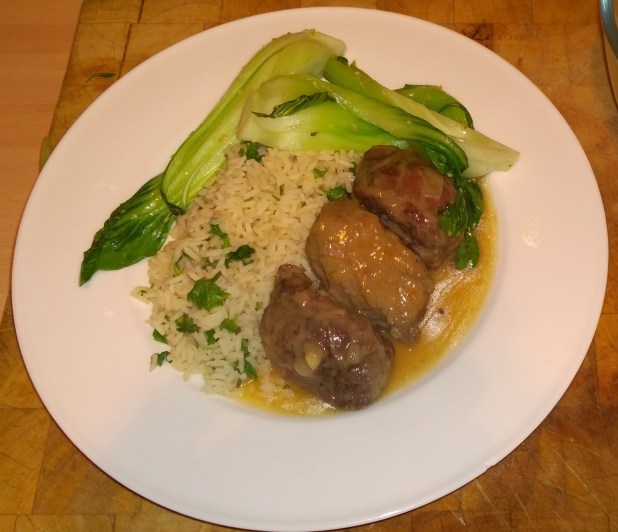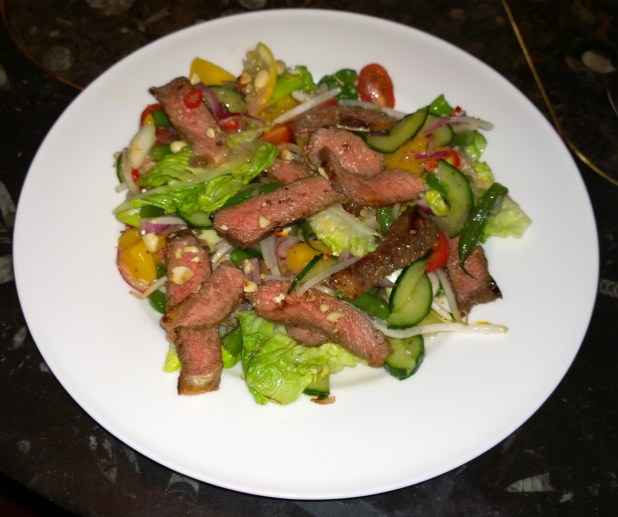 I will admit from the start that whilst this dish tasted amazing it needed at least another hours cooking, so allow a good 6 hours for this beautiful dish, voted 1st in the CNN tastiest dishes in the world in 2011! The colour should be much deeper than mine, but it still tasted really good and worthy of a few words and pictures. I will have another go later in the year and make sure I have allowed more time!!
I will admit from the start that whilst this dish tasted amazing it needed at least another hours cooking, so allow a good 6 hours for this beautiful dish, voted 1st in the CNN tastiest dishes in the world in 2011! The colour should be much deeper than mine, but it still tasted really good and worthy of a few words and pictures. I will have another go later in the year and make sure I have allowed more time!!
Having just got my driving back after a seizure 12 months ago, the freedom to be able to drive to my favourite oriental super market and farm shop was to much of a temptation to ignore. The Local See Woo was my 1st stop, where I filled my basket with essentials such as fresh Lemongrass, fresh Turmeric, birds eye Chillis, Galangal and Pandan leaf and Limes.
Casey Fields farm shop was next, a couple of Beef Short Ribs seemed to be in order (along with the usual shop) and I was starting to think what to cook. My herb and Spice cupboard is well stocked with essentials from my favourite supplier Steenbergs so all was in hand to get in the kitchen and start cooking.
 With the weather cooling slightly something warm and fragrant was in order, so looking at various cookery books, Beef Rendang seemed an ideal candidate. I found numerous versions on the web too, and went for the one on rasamalysia.com which is easy to find HERE. You need to make up as spice paste with Shallots, Lemongrass, Garlic, Ginger, Galangal and Chillis which I did in a food processor for speed. The other recipes also added Turmeric, so as I had some fresh that went in too!
With the weather cooling slightly something warm and fragrant was in order, so looking at various cookery books, Beef Rendang seemed an ideal candidate. I found numerous versions on the web too, and went for the one on rasamalysia.com which is easy to find HERE. You need to make up as spice paste with Shallots, Lemongrass, Garlic, Ginger, Galangal and Chillis which I did in a food processor for speed. The other recipes also added Turmeric, so as I had some fresh that went in too!
 The Beef Short Ribs are BIG! I took the time to put some colour on them first, giving them a burst of heat on each side before starting on the rest of the process. I think next time I cook this dish I will try Ox Cheek which is a great cut of meat for slow braising and has slightly less fat content, and is easier to handle 🙂
The Beef Short Ribs are BIG! I took the time to put some colour on them first, giving them a burst of heat on each side before starting on the rest of the process. I think next time I cook this dish I will try Ox Cheek which is a great cut of meat for slow braising and has slightly less fat content, and is easier to handle 🙂
 There are quite a few ingredients in this dish and the Star Anise, Cardamon, Cloves are fried in a little oil to release their flavour, before adding a single ‘bashed’ Lemongrass shoot. Then the spice mix is added and fried for a few minutes, finally add the Beef, Coconut Milk, Tamarind some water, Palm Sugar and Kerisik.
There are quite a few ingredients in this dish and the Star Anise, Cardamon, Cloves are fried in a little oil to release their flavour, before adding a single ‘bashed’ Lemongrass shoot. Then the spice mix is added and fried for a few minutes, finally add the Beef, Coconut Milk, Tamarind some water, Palm Sugar and Kerisik.
 Kerisik is ground Coconut that has been fried until golden brown and can be made using desiccated Coconut if you cannot find fresh, again there are lots of references on the web, you can see my 1st attempt below.
Kerisik is ground Coconut that has been fried until golden brown and can be made using desiccated Coconut if you cannot find fresh, again there are lots of references on the web, you can see my 1st attempt below. Kaffir Lime leaves are also added, I could not find mine so used some lime zest instead. The whole lot now cooks and cooks and cooks, this is a low and slow dish. There are several stages to the process which I had somehow missed (they are in the Rendang Wiki link above), the 1st stage is easy as you can see above. After approximately 3 1/2 hours, the mixture had reduced and I saw the Oil on the surface and this is where I went wrong, as I removed it, rather than letting the dish carry on cooking allowing for more evaporation, colourisation, and the flavours penetrating the meat.
Kaffir Lime leaves are also added, I could not find mine so used some lime zest instead. The whole lot now cooks and cooks and cooks, this is a low and slow dish. There are several stages to the process which I had somehow missed (they are in the Rendang Wiki link above), the 1st stage is easy as you can see above. After approximately 3 1/2 hours, the mixture had reduced and I saw the Oil on the surface and this is where I went wrong, as I removed it, rather than letting the dish carry on cooking allowing for more evaporation, colourisation, and the flavours penetrating the meat.
 You can still see lots of moisture above, the dish should be much dryer but I now know for next time. I also think that using the food processor was a bad idea, as pounding in a pestle and mortar would have produced a better textured spice paste, but cooking is about learning so some more things to remember and lessons learnt.
You can still see lots of moisture above, the dish should be much dryer but I now know for next time. I also think that using the food processor was a bad idea, as pounding in a pestle and mortar would have produced a better textured spice paste, but cooking is about learning so some more things to remember and lessons learnt.
 Panadan or Screwpine leaves are indigenous to the far east and I was going to use them too flavour the rice. I have done this before but felt more kick was needed, so made a ‘tea’ using the Pandan Leaves and putting them in simmering water for a good 5 minutes, before turning off the heat and letting stand for a good 30 minutes did the trick. I used Jasmine Rice and boiled for 10 minutes in the ‘tea’ before draining and adding some fresh Coriander.
Panadan or Screwpine leaves are indigenous to the far east and I was going to use them too flavour the rice. I have done this before but felt more kick was needed, so made a ‘tea’ using the Pandan Leaves and putting them in simmering water for a good 5 minutes, before turning off the heat and letting stand for a good 30 minutes did the trick. I used Jasmine Rice and boiled for 10 minutes in the ‘tea’ before draining and adding some fresh Coriander.
 So there you have it, it almost worked if only I had left the dish cooking for longer until the meat was darker and the moisture evaporated completely. My attempt would not have won the CNN best dish award but it was still very tasty and the meat tender, the Rice with Pandan was a great addition.
So there you have it, it almost worked if only I had left the dish cooking for longer until the meat was darker and the moisture evaporated completely. My attempt would not have won the CNN best dish award but it was still very tasty and the meat tender, the Rice with Pandan was a great addition.
………………………Until next time……………..L8ers………………..








































































